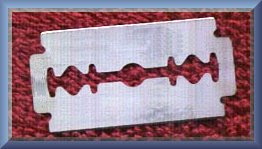
Injury gives me focus.....i cannot seem to focus and stop the spinning or emotions/ideas and thoughts (mostly thoughts that i don't want)......si gives me a temporary peace, and it works for any situation.
I Try to keep cuts shallow. Keep first aid supplies on hand and know what to do in the case of emergencies.
Do only the minimum required to ease your distress. Set limits. Decide how much you are going to allow yourself to do.

Psychological motivations:What self-injurers say SI does for themMany papers on self-harm
Escape from emptiness, depression, and feelings of unreality.
Easing tension.
Providing relief: when intense feelings build, self-injurers are overwhelmed and unable to cope. By causing pain, they reduce the level of emotional and physiological arousal to a bearable one.
Relieving anger: many self-injurers have enormous amounts of rage within. Afraid to express it outwardly, they injure themselves as a way of venting these feelings.
Maintaining a sense of security or feeling of uniqueness
Expressing emotional pain they feel they cannot bear
Obtaining or maintaining influence over the behavior of others
Communicating to others the extent of their inner turmoil
Communicating a need for support
Expressing or repressing sexuality
Validating their emotional pain -- the wounds can serve as evidence that those feelings are real
Obtaining biochemical relief: there is some thought that adults who were repeatedly traumatized as children have a hard time returning to a "normal" baseline level of arousal and are, in some sense, addicted to crisis behavior. Self-harm can perpetuate this kind of crisis state
Diverting attention (inner or outer) from issues that are too painful to examine
Exerting a sense of control over one's body
Affect regulation -- Trying to bring the body back to equilibrium in the face of turbulent or unsettling feelings. This includes reconnection with the body after a dissociative episode, calming of the body in times of high emotional and physiological arousal, validating the inner pain with an outer expression, and avoiding suicide because of unbearable feelings. In many ways, as Sutton says, self-harm is a "gift of survival." It can be the most integrative and self-preserving choice from a very limited field of options.
Communication -- Some people use self-harm as a way to express things they cannot speak. When the communication is directed at others, the SIB is often seen as manipulative. However, manipulation is usually an indirect attempt to get a need met; if a person learns that direct requests will be listened to and addressed the need for indirect attempts to influence behavior decreases. Thus, understanding what an act of self-harm is trying to communicate can be crucial to dealing with it in an effective and constructive way.
Control/punishment -- This category includes trauma reenactment, bargaining and magical thinking (if I hurt myself, then the bad thing I am fearing will be prevented), protecting other people, and self-control. Self-control overlaps somewhat with affect regulation; in fact, most of the reasons for self-harm listed above have an element of affect control in them.

An invalidating environment is one in which communication of private experiences is met by erratic, inappropriate, or extreme responses. In other words, the expression of private experiences is not validated; instead it is often punished and/or trivialized. the experience of painful emotions [is] disregarded.
The individual's interpretations of her own behavior, including the experience of the intents and motivations of the behavior, are dismissed...
Invalidation has two primary characteristics.
First, it tells the individual that she is wrong in both her description and her analyses of her own experiences, particularly in her views of what is causing her own emotions, beliefs, and actions.
Second, it attributes her experiences to socially unacceptable characteristics or personality traits.This invalidation can take many forms:
"You say no but you mean yes, i know."
"You're being hypersensitive."
"You're just lazy."
"I won't let you manipulate me like that."
"Cheer up. Snap out of it. You can get over this."
"If you'd just look on the bright side and stop being a pessimist..."
"You're just not trying hard enough."
"I'll give you something to cry about!"
Everyone experiences invalidations like these at some time or another, but for people brought up in invalidating environments, these messages are constantly received. Parents may mean well but be too uncomfortable with negative emotion to allow their children to express it, and the result is unintentional invalidation. Chronic invalidation can lead to almost subconscious self-invalidation and self-distrust, and to the "I never mattered" feelings


No comments:
Post a Comment